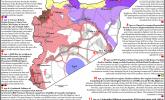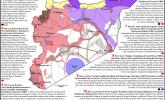Iraq Situation Report: April 15 - 21, 2020
April 24, 2020 - ISW Press
Iraq’s political elites are conditioning their support for Prime Minister (PM)-designate Mustafa al-Kadhimi on the composition of his cabinet. The US and Iran have continued their competition to influence Iraq’s future. The Iraq Situation Report (SITREP) map series summarizes key events and likely developments to come. The following SITREP map covers the period April 15 - 21, 2020.








